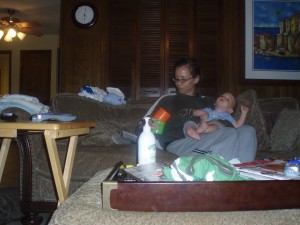 Ever feel like you have so many things on your mind, your head is about to explode? I call them Linda Blair moments. I had one last week. I was standing in the middle of my kitchen and felt like my head was spinning out of control, Exorcist-style. I couldn’t figure out what to do first: fold laundry, respond to e-mail, make dinner, schedule a doctor’s appointment, and the list went on … When my head stopped spinning long enough to take action, I grabbed a piece of paper and scrawled out a massive ‘To Do’ list. Everything and anything that was on my mind went down on that paper. I immediately felt a release of tension and a weight lifted off my shoulders. The number of to-do’s hadn’t changed; I just didn’t have to think about them non-stop. They were residing on that piece of paper, not going anywhere and I could tackle them one at a time.
Ever feel like you have so many things on your mind, your head is about to explode? I call them Linda Blair moments. I had one last week. I was standing in the middle of my kitchen and felt like my head was spinning out of control, Exorcist-style. I couldn’t figure out what to do first: fold laundry, respond to e-mail, make dinner, schedule a doctor’s appointment, and the list went on … When my head stopped spinning long enough to take action, I grabbed a piece of paper and scrawled out a massive ‘To Do’ list. Everything and anything that was on my mind went down on that paper. I immediately felt a release of tension and a weight lifted off my shoulders. The number of to-do’s hadn’t changed; I just didn’t have to think about them non-stop. They were residing on that piece of paper, not going anywhere and I could tackle them one at a time.
According to neuroscientists, humans think anywhere from 12,000 to 50,000 thoughts per day. I’d be willing to bet that parents think even more. The researchers also claim that up to 98 percent of our daily thoughts are the same ones we had the day before! It’s like having the most annoying CD you can think of, on repeat, in your car stereo, on a 12 hour road trip. No fun. Grabbing a notebook, or a laptop, and downloading your thoughts can help you to clear your head space and move forward with your day. Here’s four ideas for putting pen to paper (or fingers to keyboard) and ending the never-ending loop of misery:
Write Your To-Do List: As I described earlier, I’m a big list maker. When I take the time to write out everything I want to accomplish, it helps me to organize my week. It also helps me to focus on one task as a time instead of fretting about all 30 items on my list. My favorite part? Taking a highlighter and crossing completed items off the list. Even the smallest tasks (ie. cleaning out my son’s sock drawer) can feel like a major accomplishment.
Write Your Thoughts: When I bring up journaling with my clients who are struggling with anxiety or depression, most of them say, “Oh, I’ve tried that and I couldn’t stick with it.” That’s when I encourage them to try again. I explain that I’m not asking them to pen an Ann-Frank-style diary that is gorgeously written and going to be published later. We’re talking about pulling out a notebook, a scrap of paper, or a computer and just letting it all out, free-association-style. If you’re worried about something, write. If you’re so excited that you can’t go to sleep, write. Getting the thoughts out of your brain and onto paper will help you to release the tension and might even help you to gain perspective. Journaling is also a healthy and low-cost alternative to addictive behaviors and toxic distractions. You don’t have to write every day… just write when your brain tells you that you need to. And then save it, rip it up, read it to a friend or burn it. Whatever feels right to you.
Write Your Trauma: Just down from the street from us, at UT Austin, Dr. James Pennebaker has been conducting research for years on the positive impacts of journaling, especially for individuals suffering from PTSD. His program, Writing to Heal, is based on the premise that journaling can be even more effective than counseling in many cases. (Bad news for my profession but great news for anyone who has experienced trauma.) If you were an abused child, a soldier in the trenches, or a mother who has endured a difficult birth or a colicky baby, you might find that writing about your experience will help you to process it, purge it and move forward. Want more info? Click here for a great article about Dr. Pennebaker and his Writing to Heal suggestions. (Quick caveat: If your gut tells you that writing about a past trauma might bring up heavy emotions or flashbacks, I encourage you to schedule with an experienced therapist before diving into your memories.)
Write Your Gratitudes: At times, we have so many negative thoughts occupying our brains, it can be hard to squeeze in the positive. Getting in the habit of writing (or typing) a list of things you are thankful for can help you to find your footing and even change your perspective. Almost always, when we start listing them, our gratitudes outweigh our complaints and concerns. Inserting little positive reminders into our thought patterns can help us to feel less burdened by the negative.
Cheryl and I both love to write. Cheryl carries beautifully bound notebooks with her at all times, filled with pages of deep thoughts, doodles and lists. I’m more of a “pull a piece of paper out of the recycling bin and find a crayon” kind of gal. It doesn’t matter how you do it, just do it. You’ll find that writing is one of the most beneficial self-care activities you can indulge in. It’s free, it’s portable and it’s therapeutic. You can’t get much better than that.
Here’s to sanity and Linda Blair,
Kirsten





 Yes, my nostrils, eyes and hair are fun to stick fingers in. All of the time. Said no mom ever.
Yes, my nostrils, eyes and hair are fun to stick fingers in. All of the time. Said no mom ever.



























